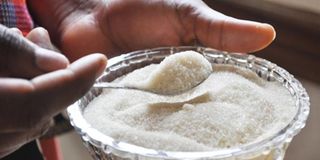Proposed sugar tax: Poor to bear brunt of higher costs

A woman collects sugar from a sugar bowl. Sugar price increments usually have effects on other products where sugar is the major input. PHOTO BY RACHEL MABALA
What you need to know:
Previously, slight increments in taxes, such as the one proposed, have resulted in higher price increments than the actual increments in taxation. Mark Keith Muhumuza spoke to manufacturers who said any increment in the taxation of sugar produced in Uganda would lead to an influx of “cheap” sugar imports from Brazil, which would in turn affect many producers in the country.
Government’s proposal to increase taxation on sugar is being met by stiff opposition from the sugar manufacturers and the civil society. In the Excise Duty (amendment) Bill 2016, the government is proposing an increment of taxation on beet sugar and cane from Shs50 to Shs100. This is an increment of about 100 per cent. Beet sugar and cane are some of the inputs used in the sugar production process. The tax will be imposed on each kilogramme of the final product: Sugar.
Uganda Sugar Manufacturers Association (USMA) has already written a protest letter to the Uganda Manufacturers Association (UMA) and the Private Sector Foundation Uganda (PSFU) warning that this will have consequences on the costs of production and consumer prices.
“We read and we wrote to UMA and PSFU that this will increase the cost of sugar again,” Jim Mwine Kabeho, the chairman USMA told Daily Monitor in a telephone interview. He insisted that the Shs50 additional tax “was very big.” He did not give further details but said: “We have a complaints procedure method and, for now, that is through UMA and PSFU.”
The manufacturers are noted to have said any increment in the taxation of sugar produced in Uganda would lead to an influx of “cheap” sugar imports from Brazil, which would in turn affect many producers in the country.
Uganda’s sugar prices average about Shs3,500 a kilogramme, which is up from Shs2,450 in 2014 and Shs3,100 in 2013, according to the 2015 Uganda Bureau of Statistics (Ubos) Statistical Abstract. The sugar prices rose in most of 2015 due to the depreciation of Uganda Shilling, which increased costs of production at various factories. Sugar price increments often have effects on other products where sugar is the major input.
Increased sugar price
As a result, this pushes up core inflation – the prices of other goods and services excluding fuel, energy, water and food, which Bank of Uganda (BoU) uses as an indicator to set Central Bank Rate (CBR) once every two months. At the start of 2015, core inflation was expected to be around the 5 per cent range but BoU in the Monetary Policy Statement for February 2016 revealed that it would be about 6 to 8 per cent in 2016 as prices are expected to rise.
Julius Mukunda, the coordinator, Civil Society Budget Advocacy Group (CSBAG) warned that sugar prices would increase beyond the level of the tax imposed.
“Sugar is an input for so many things and increasing that by 100 per centwould definitely lead to a hike in prices. Already, we are taxing sugar so any increment would result in prices going up by between Shs100 and Shs200,” Mukunda said in an interview with Daily Monitor.
He further points out that the government should not have imposed additional taxes on sugar because it would end up hurting most Ugandans.
“We don’t have enough sugar. If we did, then we would have seen prices going down. The prices are up already. So, this tax is a soft spot. We need to aggressively come up with other options for areas of taxation, like property tax. With sugar tax, the bulk of the effect is on the poor and not the rich,” Mukunda adds.
Sugar production in Uganda is estimated at 426,000 metric tonnes in 2013/14, according to USMA, which was above the consumption of 403,874 metric tons over the same period. This means demand continues outstripping supply, but it has not been reflective on the final price of sugar.
Tell the truth
The government is not backing down on this tax as the Finance Minister, Matia Kasaija told the Daily Monitor. In a telephone interview, Kasaija described it as “this little tax”, which is supposed to affect only consumers. Kasaija noted that this tax is to be paid by the consumer and is being imposed on ready-to-take sugar only.
“The little tax we are putting up has nothing to do with manufacturers. This is a consumer price which will be passed over to you and me. So, on each kilo of sugar, you will pay an extra Shs50,” Kasaija noted.
The ministry of finance plays down effects on the manufacturers unless they argue that it will hold back demand. However, since the tax is being described as a small increment, the ministry of Finance does not expect prices to shoot through the roof.
“This is just a very minimal increment in the price except the traders who act like taxi drivers. The traders may use this as an opportunity to put the price up but I think it is up to the manufacturers and government to explain to people that sugar prices will not increase by more than Shs50,” Kasaija says.
Kasaija says that it is not right if manufacturers claim that it is going to increase production costs.
If approved by Parliament, this will be the second increment on excise duty of sugar in three financial years. The last time there was an increment - from Shs25 to Shs50 - in 2014/15 financial year sugar prices did not change significantly until the start of 2015.




